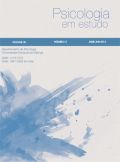NARRATIVAS MEMORIALÍSTICAS E ARTE NA CENA DA PESQUISA PSICANALÍTICA DE FENÔMENOS SOCIAIS
Resumo
No presente texto, deseja-se apresentar o proceder metodológico da pesquisa ‘Adolescências e leis’ (Fapemig, 2016-2018), afirmando o movimento que tenta alcançar uma topologia da horizontalidade ao considerar todos os saberes formais, informais, estéticos e pessoais envolvidos no processo. Nesse contexto, as narrativas memorialísticas erigem-se como estratégia de acesso à história dos sujeitos, jovens pobres moradores de territórios violentos. Essa estratégia considera a proposta da psicanálise, pois permite pensar a ficção através da qual toda história é contada. Após recolher as narrativas, o material registrado foi encaminhado para artistas convidados a transformar as histórias escutadas em obras artísticas e literárias. Em uma oficina devolutiva, envolvendo todos os atores (pesquisadores, coletivo de artistas e jovens), as obras foram entregues aos próprios narradores. Esse encontro possibilitou escutar os jovens das narrativas e capitanear pontos de real que retornaram pela via do traumático, da afirmação do desejo ou da repetição, indicando possíveis processos de ressignificação subjetiva e discursiva, bem como novos trajetos teóricos e metodológicos para o uso das narrativas memorialísticas.
Downloads
Referências
Autor(es)/(as) (2017) – Incluir referência após a avaliação por pares.
Badiou, A. (1995). Ética: um ensaio sobre a consciência do mal. Rio de Janeiro: Relume Dumará.
Chrisóstomo, M. C., Moreira, J. de O., Guerra, A. M. C. & Neto, F. K. (2018, agosto). A pesquisa psicanalítica de fenômenos sociais: algumas considerações. Psicologia em Revista, 24(2), 645-660.
Lacan, J. (2008). O seminário, livro 11: os quatro conceitos fundamentais da psicanálise. M. D. Magno (Trad.). J.-A. Miller (Estabelecimento do texto). Rio de Janeiro: Jorge Zahar. (Obra original publicada em 1964).
Lacan, J. (2016). O seminário, livro 6: o desejo e sua interpretação. C. Berliner (Trad.). A. Harari & M. A. Vieira (Versão final). A. Telles (Preparação de texto). J.-A. Miller (Estabelecimento do texto). Rio de Janeiro: Zahar. (Obra original publicada em 1958-59).
Maffesoli, M., & Icle, G. (2011). Pesquisa como Conhecimento Compartilhado: uma entrevista com Michel Maffesoli. Educação & Realidade, 36(2), 521-532. Recuperado em 08 janeiro, 2019, de https://seer.ufrgs.br/educacaoerealidade/article/view/20637/12917.
Muylaert, C. J., Júnior, V. S., Gallo, P. R., Neto, M. L. R. & Reis, A. O. A. (2014). Entrevistas narrativas: um importante recurso em pesquisa qualitativa. Revista da Escola de Enfermagem da USP, 48(Esp2), 193-199.
Nascimento, P. C. & Kind, L. (2018). Narrativas posithivas: vulnerabilidade de mulheres ao hiv/aids em relações heterossexuais de conjugalidade. Linhas críticas, 24, 85-105. doi: 10.26512/lc.v24i0.18957
Rancière, J. (2005). A partilha do sensível: estética e política. M. C. Netto (Trad.). São Paulo: EXO Experimental; Org. Editora 34.
Rudge, A. M. (2009). Trauma. (Coleção Psicanálise passo-a-passo). Rio de Janeiro: Jorge Zahar Ed.
Silva, D. G. V. & Trentini, M. (2002). Narrativas como técnica de pesquisa em enfermagem. Rev Latino-am Enfermagem. 10(3), 423-432. Recuperado em 10 agosto, 2018, de http://www.scielo.br/pdf/rlae/v10n3/13352.pdf.
Vale, S. C. & Castro, J. E. de (2013). O tempo e o ato psicanalítico na direção do tratamento. Tempo Psicanalítico, 45(I), 439-451. Recuperado em 10 setembro, 2018, de http://pepsic.bvsalud.org/pdf/tpsi/v45n2/v45n2a12.pdf.
Copyright (c) 2022 Psicologia em Estudo

This work is licensed under a Creative Commons Attribution 4.0 International License.
As opiniões emitidas, são de exclusiva responsabilidade do(s) autor(es). Ao submeterem o manuscrito ao Conselho Editorial de Psicologia em Estudo, o(s) autor(es) assume(m) a responsabilidade de não ter previamente publicado ou submetido o mesmo manuscrito por outro periódico. Em caso de autoria múltipla, o manuscrito deve vir acompanhado de autorização assinada por todos os autores. Artigos aceitos para publicação passam a ser propriedade da revista, podendo ser remixados e reaproveitados conforme prevê a licença Creative Commons CC-BY.
The opinions expressed are the sole responsibility of the author (s). When submitting the manuscript to the Editorial Board of Study Psychology, the author (s) assumes responsibility for not having previously published or submitted the same manuscript by another journal. In case of multiple authorship, the manuscript must be accompanied by an authorization signed by all authors. Articles accepted for publication become the property of the journal, and can be remixed and reused as provided for in theby a license Creative Commons CC-BY.
















